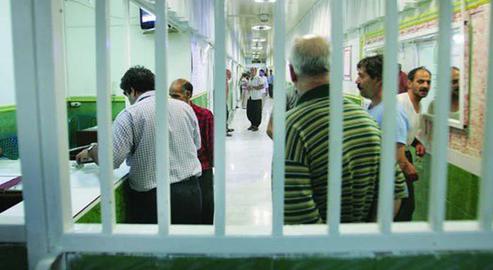Imprisonment not only affects convicts but their relatives immensely. Aside from the psychological impact, the resulting financial losses can affect every aspect of their lives.
The treatment of detainees by Iran’s Prisons Organization and the government make this financial burden even worse. Prison stores sell low-quality, counterfeit goods, at higher prices than on the outside which prisoners have no choice but to pay. Many inmates have to work in prison workshops for meager wages in order to get by.
The following report on prison shops and workshops is based on the eyewitness accounts of former inmates at Evin Prison and the Greater Tehran Penitentiary, known as Fashafuyeh.
***
The number of prisoners in Iran is now 30 times what it was before the Islamic Republic came into being. Officials say that Iranian prisons now hold around 300,000 inmates, with many well over their official capacity.
The growth of Iran’s prison population has taken place alongside a dramatic increase in the number of physical prisons, as well as the expansion of existing facilities. Each prison has various wards, and each ward holds prisoners in different “halls”.
Evin Prison in Tehran is one of the country’s most infamous. Each hall of Evin has a shop that sells food, clothing and health products: all the commodities most prisoners get access to for the duration of their time behind bars. Those inmates who can’t eat prison rations, for health or religious reasons, for example, have to buy all their food from these shops. But according to many, their wares are expensive, poor-quality - and even dangerous.
Low-Quality and Counterfeit Goods
“Whatever you buy from the prison shop costs up to twice the current price outside,” says Mehrshad, who was formerly a political prisoner at both Evin and Fashafuyeh. “The prices range from 10 percent to double the price outside. It doesn’t matter if the merchandise is food, shampoo or just a toothbrush.”
Many of the goods on offer, he adds, are low quality, counterfeit, or both. “Because of a skin problem, I had to wash my hair with a specific shampoo. I had to buy this shampoo from the prison shop at two and a half times its normal price.
“Still my problem kept getting worse. Then I found out it was fake. Besides the regular brands, the prison shop also contained brands I’d never heard of, and that I never saw again after I left prison. But we had to buy them; we had no other choice.”
Want Edible Food? Pay Up!
Mahmoud, another former inmate of Evin and Fashafuyeh, says the quality of food in both facilities is beyond dire. “It is really so bad you can’t get near it. I asked myself for a long time, how can they be cooking such awful food?
“Then I learned it was deliberate. They give inmates such bad food that they’re forced to resort to the prison shop, and since there is no competition, these shops can sell food or anything else at whatever price they like. In other words, they implicitly get you to spend money, or go hungry.”
He also pointed out a clothing “fix” at Greater Tehran Penitentiary: “The monopoly the prison shops enjoy is bizarre. At Evin Prison, families are allowed to bring inmates seven items of clothing every six months. But at Fashafuyeh, the families can only buy clothing from a shop at the entrance to the prison, which is then handed over to the prisoner. They end up getting very low-quality clothing at the same cost as an expensive boutique in northern Tehran.”
One example of the inflated prices at prison shops is tuna. When a can of tuna was selling for 14,000 tomans (US$3.36) on the outside, in prison the same can went for 22,000 tomans ($5.28).
Forced Labor for a Pittance
Financial exploitation is not limited to the shops, Masoud said, but exists in other parts of the prison apparatus too. “When I was at Evin Prison, there was a place called ‘Tailors’ Hall’. Every day at eight in the morning, some of the inmates went to this workshop and made things like shirts, medical gowns, trousers, and so on. When they came back from the workshop, they just ate something and immediately went to sleep.
“They were filling the pockets of prison officials for a small amount of money. In 2019, prisoners were being paid 600,000 tomans (US$144) for 176 hours of work a month. A lot of the items they made were sold to chain stores outside the prison.”
Complaining Gets You Nowhere
Both ex-prisoners said they had complained about the low-quality and expensive goods at prison shops, to no avail. “Our protests [over the price of tuna] didn’t get anywhere because there was a monopoly,” said Masoud.
The complaints were also met with reprisal from the prison authorities. In 2012, Human Rights Activists News Agency (HRANA) reported: “Since political prisoners complained about high prices in the prison shop, the shop is no longer providing what the inmates need and political prisoners are facing many problems.”
Many other prisoners have also reported that prison administrators stopped serving fresh fruit and vegetables with the regular meals, forcing inmates to purchase them from the shops instead.
“There are numerous prisoners who have completely given up on fruit and vegetables,” said Masoud. “The money they have is just enough for the basics. There’s nothing left to spend on healthy food. While I was in prison I only bought fruit once a month; many others like me couldn’t afford it at all.”
Related coverage:
IranWire Exclusive: Sex Workers in Tehran Jails
Rich and Well-Connected Prisoners Enjoy Extended Furloughs in Their Luxury Villas
Ex-Guards Fixer Jailed for Corruption Living Large in Prison
Fact Check: Does the Islamic Republic Really Fight Corruption?
From Luxury Villas to Defrauded Banks: The Mother of All Corruption Cases Gets Under Way in Iran
Financial Criminals and Prison Guards Set Up Factories Behind Bars
Financial Criminals and Prison Guards Set Up Factories Behind Bars
visit the accountability section
In this section of Iran Wire, you can contact the officials and launch your campaign for various problems

























comments